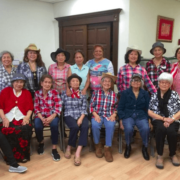Adult care centers are important fixtures in the Filipino-American community.
This little piece takes us not just to a place, but into the minds and hearts, the courage, the wisdom and humor of those in the twilight of their years — a society that glorified youth.
At the Culver City Senior Center, the atmosphere was bustling and of contentment.
The big room was filled with light from the tall windows, so you could see the older people clearly. There were about 70, most them sitting at the tables. Most men were just sitting and looking, while some groups of them played cards. A table full of women chatted.
The social director of the center took me around, as the old faces were raised in interest and a number nodded and smiled.
I had confessed that I had not expected to find happiness here. I had come to this place, recoiling in apprehension from the smell of age, the apparition of infirmity, apathy and resignation.
Most of us, I think, are weighed down with a sense of guilt about the old. They are not as cherished as our parents did; we seem to have little room for them in our hearts or lives. Mistakenly, we have come to believe that they need us more than we need them.
Then came the revelation of old people finding their place together, their own, where they belonged . The old people who came to the center, can not be so different from the tens of thousands who live in this city. Many of them, especially the men, (we’d be told) live in furnished rooms, alone, on old age relief. After working all of their lives, they have nothing to do.
Degeneration of the spirit and the tissues takes its relentless interacting course as they either sit their hours out in chronic depression or haunt clinics and hospitals, not so much to cure their ailments as to have attention, to be able to speak to somebody. At all of these community centers for the aged, there are many old people who still live with their relatives in comparative security, but to read their histories is to know that there is hardly one who does not feel a burden: unwanted, useless and dependent.
When I think about it, there is hardly one person who is not aware of the tensions this feeling produces. Younger people keep them, out of duty or pity, even if love is present. Could this be why they become difficult to others? The elders strain for that sense of importance and worth they each feel they have earned and have been denied to the point of giving up and waiting until they can die.
These centers provided leisure time activities for the older person. In Culver City, Beverly Hills, Santa Monica and Silver Lake, they have a membership of 200-300. About 150 come in a day; some every day, while others, a few times a week. They range from 60-94 years old, with most of them in their 70s. Some are foreign-born, but in Beverly Hills, Jewish dominate.
It is significant that most of the older people came to this center not immediately after retirement, abut after many years of living alone. It is open every day from 9 to 5. To most of the men, this span is a substitute for their business day, and who knows for some others, the club. Even those who have families find that they cherish this freedom to be themselves. For the women, the center means family, gossip, and companionship. For both sexes, we’re told, this is the audience they crave.
These elderly, when they first come to the center, are timid, withdrawn and insecure. Then gradually through cards, music class, dramatics or a committee (there are lots of committees) they begin to emerge, make contact, stir old skills and dream.
At the start, some were tense, rigid, and extremely reserved — even aloof when they came to the center, then they started to relate with each other by reading poetry, singing, dancing and applauding each other during sessions.
But the director said one cannot assume, because of the many happy responses, that sweetness and light are the order of each day. Competitiveness, jealousy, pique, hurt feelings, obsessions of inferiority can explode periodically.
There’s the “show off” who throws her Switzerland finishing school education; one who is annoyed because an art instructor spends more time with another; and for those who are not habitual card players, they’re looked down upon because they don’t do anything for the center, as related to us.
Of course, some of the explosions are more comic than tragic.







